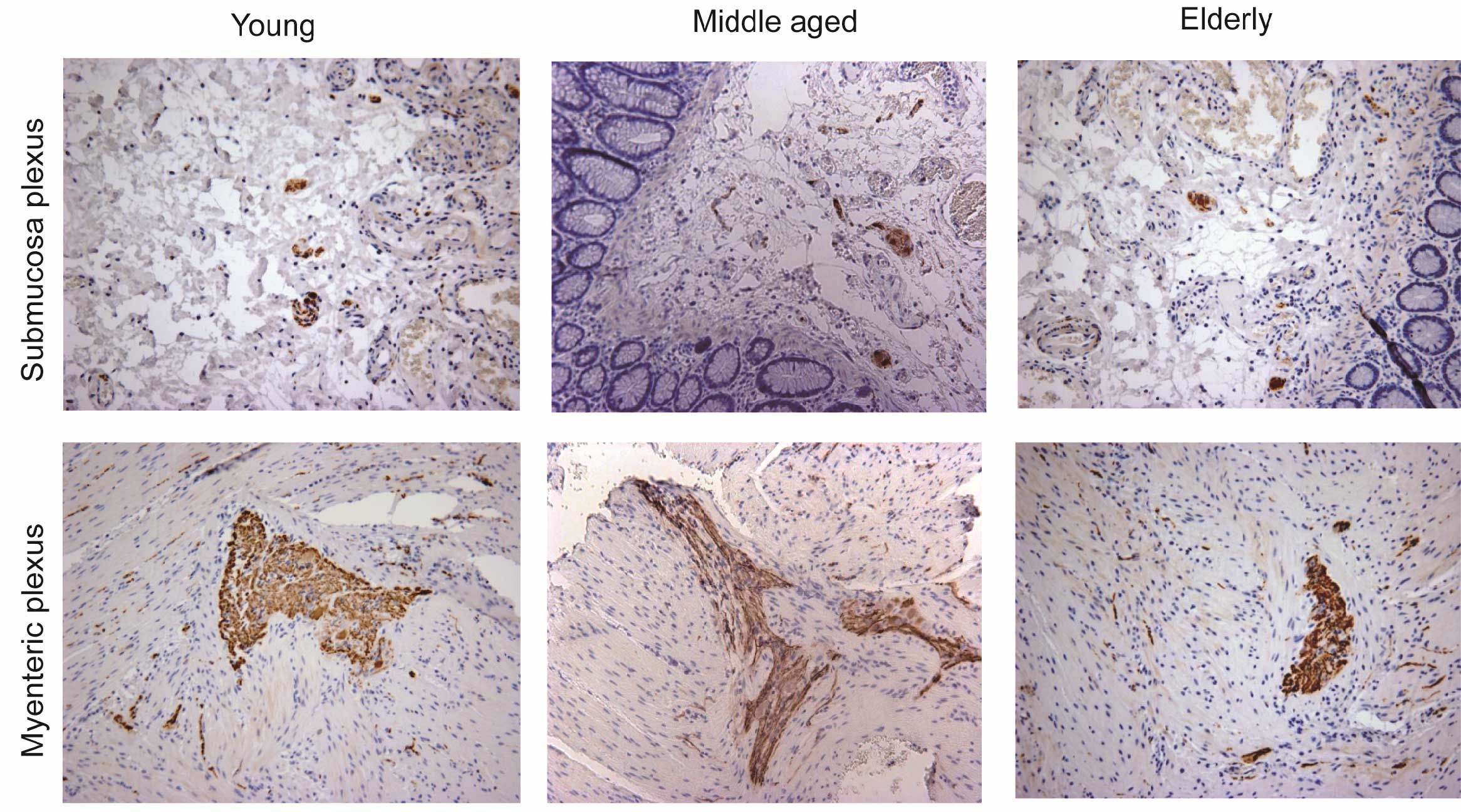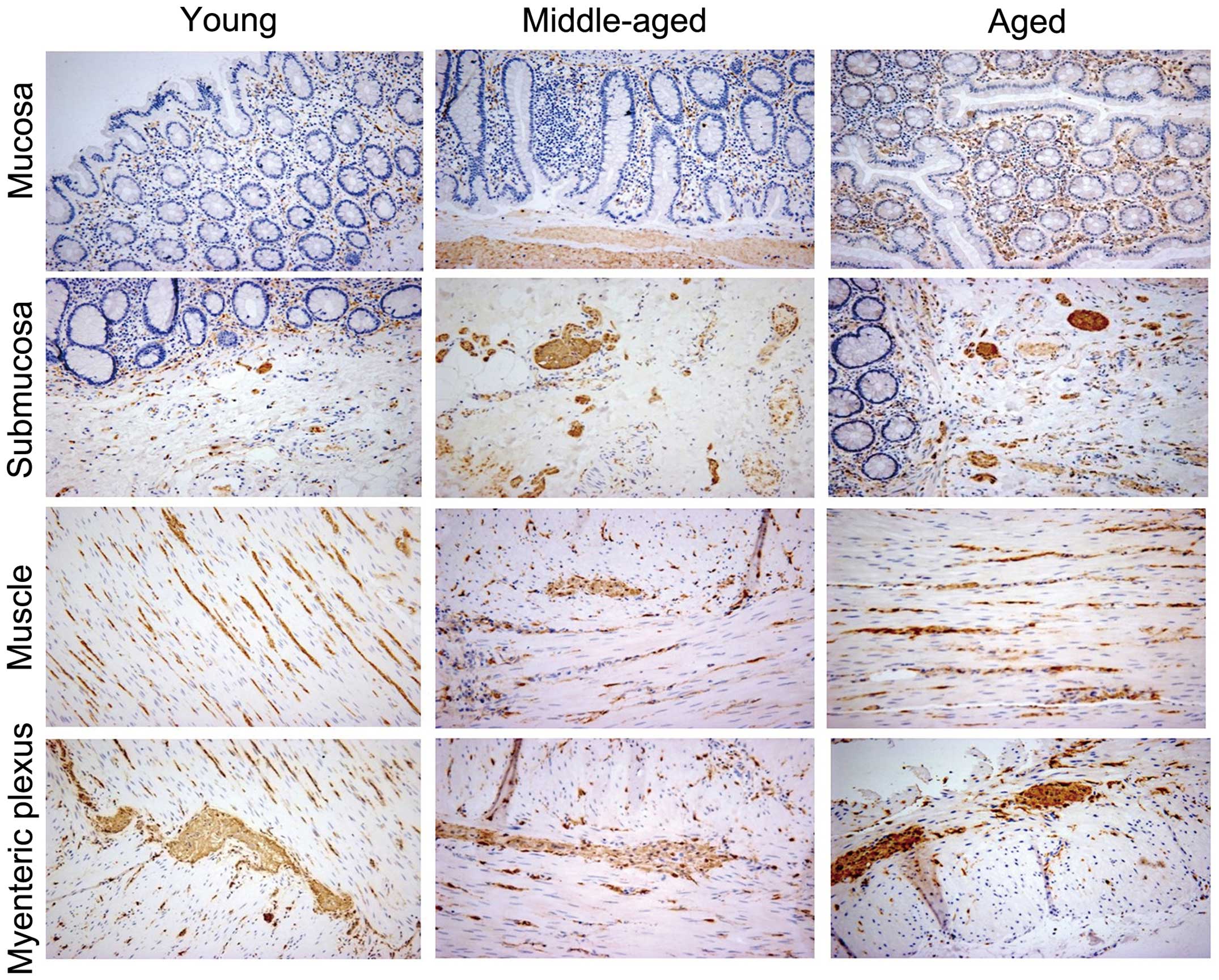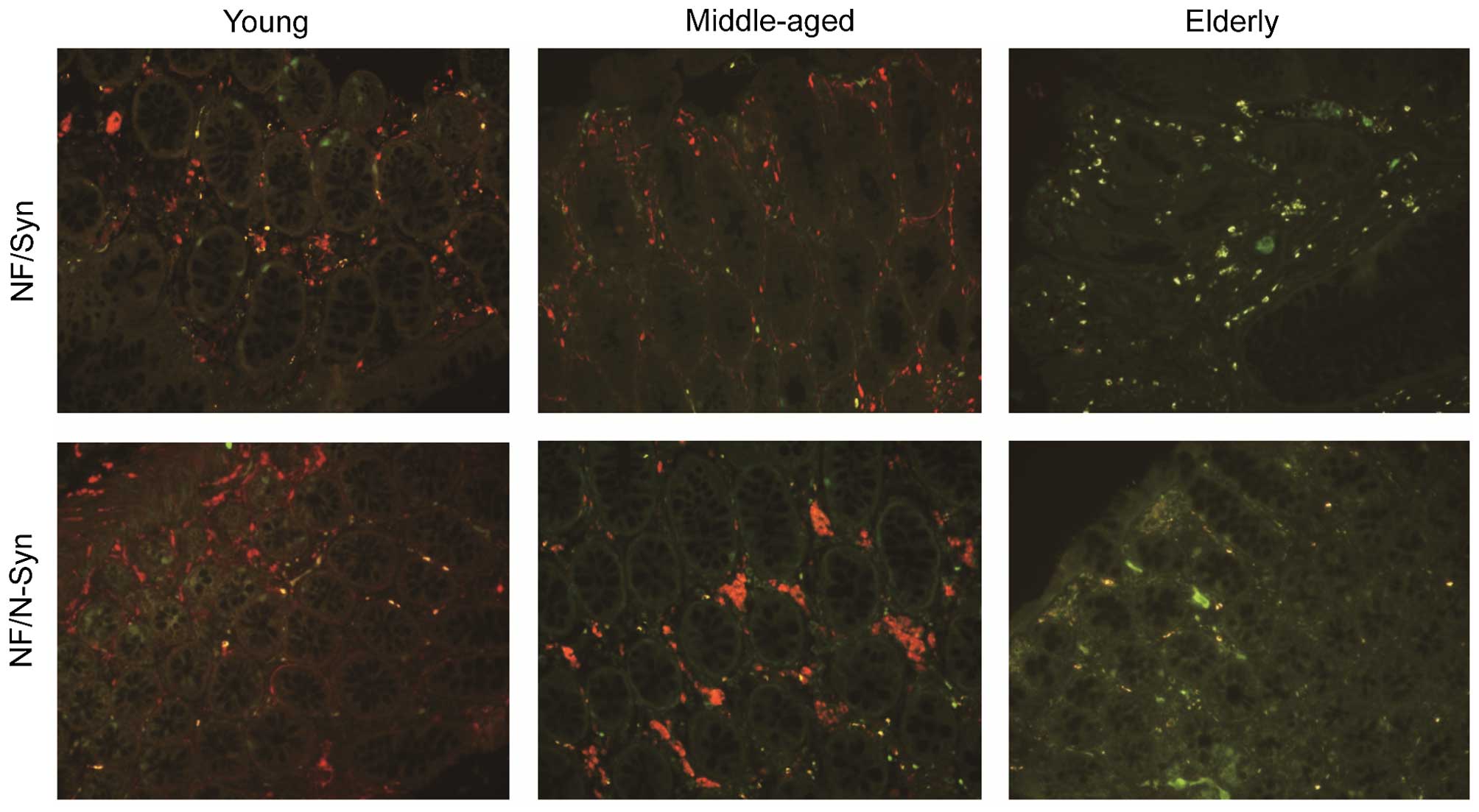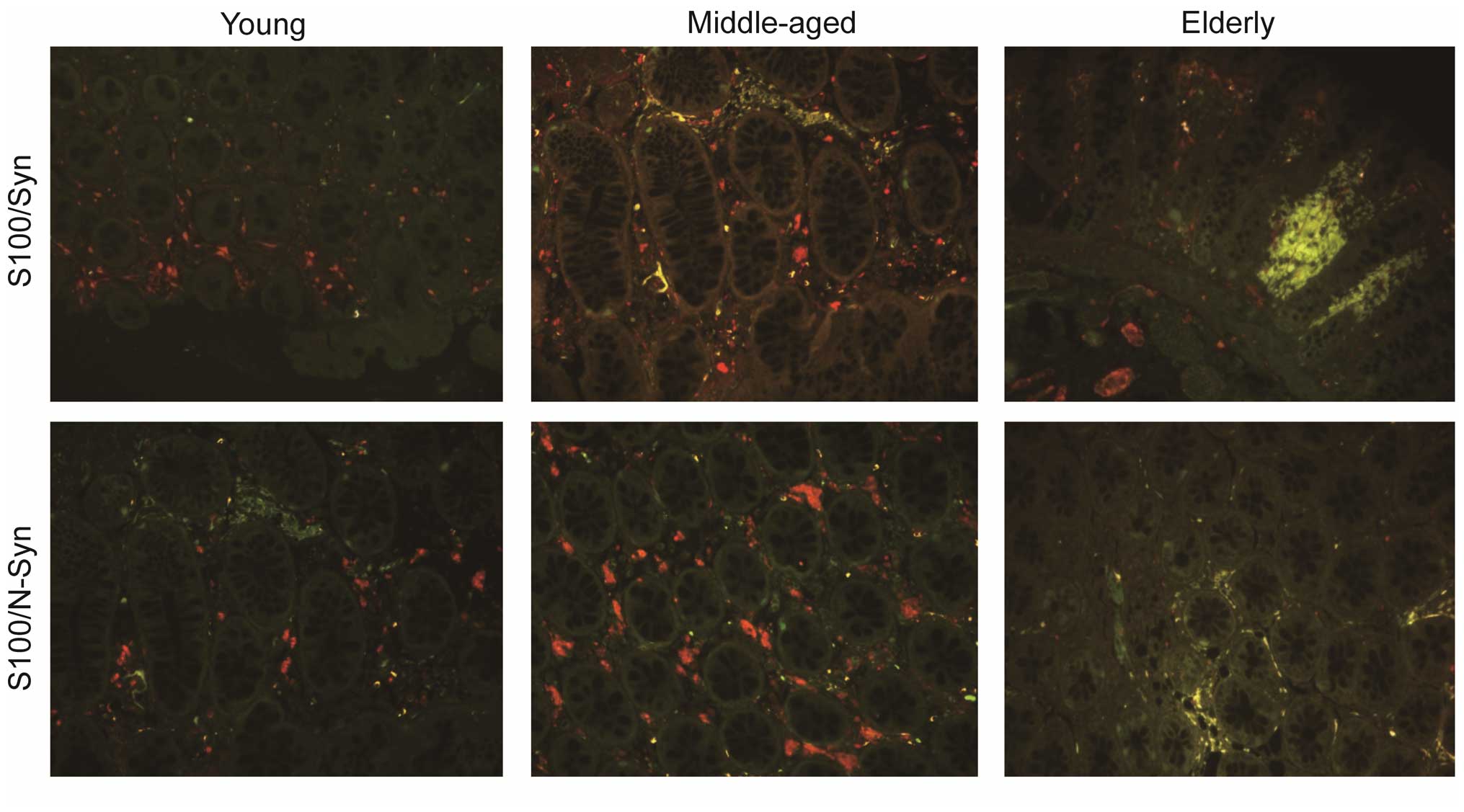|
1
|
Norton C: Constipation in older patients:
Effects on quality of life. Br J Nurs. 15:188–192. 2006. View Article : Google Scholar : PubMed/NCBI
|
|
2
|
Wattchow D, Brookes S, Murphy E, Carbone
S, De Fontgalland D and Costa M: Regional variation in the
neurochemical coding of the myenteric plexus of the human colon and
changes in patients with slow transit constipation.
Neurogastroenterol Motil. 20:1298–1305. 2008. View Article : Google Scholar : PubMed/NCBI
|
|
3
|
Phillips RJ, Pairitz JC and Powley TL:
Age-related neuronal loss in the submucosal plexus of the colon of
Fischer 344 rats. Neurobiol Aging. 28:1124–1137. 2007. View Article : Google Scholar
|
|
4
|
Phillips RJ and Powley TL: Innervation of
the gastrointestinal tract: Patterns of aging. Auton Neurosci.
136:1–19. 2007. View Article : Google Scholar : PubMed/NCBI
|
|
5
|
Bellani S, Sousa VL, Ronzitti G, Valtorta
F, Meldolesi J and Chieregatti E: The regulation of synaptic
function by alpha-synuclein. Commun Integr Biol. 3:106–109. 2010.
View Article : Google Scholar : PubMed/NCBI
|
|
6
|
Sousa VL, Bellani S, Giannandrea M, Yousuf
M, Valtorta F, Meldolesi J and Chieregatti E: {alpha}-synuclein and
its A30P mutant affect actin cytoskeletal structure and dynamics.
Mol Biol Cell. 20:3725–3739. 2009. View Article : Google Scholar : PubMed/NCBI
|
|
7
|
Adamczyk A, Solecka J and Strosznajder JB:
Expression of alpha-synuclein in different brain parts of adult and
aged rats. J Physiol Pharmacol. 56:29–37. 2005.PubMed/NCBI
|
|
8
|
Beach TG, Adler CH, Sue LI, Vedders L, Lue
L, White lii C, Akiyama H, Caviness JN, Shill HA, Sabbagh MN and
Walker DG: Arizona Parkinson's Disease Consortium: Multi-organ
distribution of phosphorylated alpha-synuclein histopathology in
subjects with Lewy body disorders. Acta Neuropathol. 119:689–702.
2010. View Article : Google Scholar : PubMed/NCBI
|
|
9
|
Wenning GK and Jellinger KA: The role of
alpha-synuclein and tau in neurodegenerative movement disorders.
Curr Opin Neurol. 18:357–362. 2005. View Article : Google Scholar : PubMed/NCBI
|
|
10
|
Phillips RJ, Walter GC, Wilder SL,
Baronowsky EA and Powley TL: Alpha-synuclein-immunopositive
myenteric neurons and vagal preganglionic terminals: Autonomic
pathway implicated in Parkinson's disease? Neuroscience.
153:733–750. 2008. View Article : Google Scholar : PubMed/NCBI
|
|
11
|
Fujiwara H, Hasegawa M, Dohmae N,
Kawashima A, Masliah E, Goldberg M, Shen J, Takio K and Iwatsubo T:
Alpha-Synuclein is phosphorylated in synucleinopathy lesions. Nat
Cell Biol. 4:160–164. 2002.PubMed/NCBI
|
|
12
|
Giasson BI, Duda JE, Murray IV, Chen Q,
Souza JM, Hurtig HI, Ischiropoulos H, Trojanowski JQ and Lee VM:
Oxidative damage linked to neurodegeneration by selective
alpha-synuclein nitration in synucleinopathy lesions. Science.
290:985–989. 2000. View Article : Google Scholar : PubMed/NCBI
|
|
13
|
Chen LI and Feany MB: Alpha-synuclein
phosphorylation controls neurotoxicity and inclusion formation in a
drosophila model of parkinson disease. Nat Neurosci. 8:657–663.
2005. View
Article : Google Scholar : PubMed/NCBI
|
|
14
|
Yamin G, Uversky VN and Fink AL: Nitration
inhibits fibrillation of human alpha-synuclein in vitro by
formation of soluble oligomers. FEBS Lett. 542:147–152. 2003.
View Article : Google Scholar : PubMed/NCBI
|
|
15
|
Yu Z, Xu X, Xiang Z, Zhou J, Zhang Z, Hu C
and He C: Nitrated alpha-synuclein induces the loss of dopaminergic
neurons in the substantia nigra of rats. PLoS One. 5:e99562010.
View Article : Google Scholar : PubMed/NCBI
|
|
16
|
Xuan Q, Xu SL, Lu DH, Yu S, Zhou M, Uéda
K, Cui YQ, Zhang BY and Chan P: Increased expression of α-synuclein
in aged human brain associated with neuromelanin accumulation. J
Neural Transm (Vienna). 118:1575–1583. 2011. View Article : Google Scholar
|
|
17
|
Yu S, Li X, Liu G, Han J, Zhang C, Li Y,
Xu S, Liu C, Gao Y, Yang H, et al: Extensive nuclear localization
of alpha-synuclein in normal rat brain neurons revealed by a novel
monoclonal antibody. Neuroscience. 145:539–555. 2007. View Article : Google Scholar : PubMed/NCBI
|
|
18
|
Madsen JL and Graff J: Effects of ageing
on gastrointestinal motor function. Age Ageing. 33:154–159. 2004.
View Article : Google Scholar : PubMed/NCBI
|
|
19
|
McHugh SM and Diamant NE: Effect of age,
gender and parity on anal canal pressures. Contribution of impaired
anal sphincter function to fecal incontinence. Dig Dis Sci.
32:726–736. 1987. View Article : Google Scholar : PubMed/NCBI
|
|
20
|
Phillips RJ, Kieffer EJ and Powley TL:
Aging of the myenteric plexus: Neuronal loss is specific to
cholinergic neurons. Auton Neurosci. 106:69–83. 2003. View Article : Google Scholar : PubMed/NCBI
|
|
21
|
Wade PR: Aging and neural control of the
GI tractI. Age-related changes in the enteric nervous system. Am J
Physiol Gastrointest Liver Physiol. 283:G489–G495. 2002. View Article : Google Scholar : PubMed/NCBI
|
|
22
|
Bernard CE, Gibbons SJ, Gomez Pinilla PJ,
Lurken MS, Schmalz PF, Roeder JL, Linden D, Cima RR, Dozois EJ,
Larson DW, et al: Effect of age on the enteric nervous system of
the human colon. Neurogastroenterol Motil. 21:7462009. View Article : Google Scholar : PubMed/NCBI
|
|
23
|
Lebouvier T, Chaumette T, Damier P, Coron
E, Touchefeu Y, Vrignaud S, Naveilhan P, Galmiche JP, Bruley des
Varannes S, Derkinderen P and Neunlist M: Pathological lesions in
colonic biopsies during Parkinson's disease. Gut. 57:1741–1743.
2008. View Article : Google Scholar : PubMed/NCBI
|
|
24
|
Phillips RJ, Walter GC, Ringer BE, Higgs
KM and Powley TL: Alpha-synuclein immunopositive aggregates in the
myenteric plexus of the aging Fischer 344 rat. Exp Neurol.
220:109–119. 2009. View Article : Google Scholar : PubMed/NCBI
|
|
25
|
Lebouvier T, Neunlist M, Burley des
Varannes S, Coron E, Drouard A, N'Guyen JM, Chaumette T, Tasselli
M, Paillusson S, Flamand M, et al: Colonic biopsies to assess the
neuropathology of parkinson's disease and its relationship with
symptoms. PLoS One. 5:e127282010. View Article : Google Scholar : PubMed/NCBI
|
|
26
|
Choi DY, Zhang J and Bing G: Aging
enhances the neuroinflammatory response and alpha-synuclein
nitration in rats. Neurobiol Aging. 31:1649–1653. 2010. View Article : Google Scholar
|
|
27
|
Siebert H, Kahle PJ, Kramer ML, Isik T,
Schlüter OM, Schulz-Schaeffer WJ and Brück W: Over-expression of
alpha-synuclein in the nervous system enhances axonal degeneration
after peripheral nerve lesion in a transgenic mouse strain. J
Neurochem. 114:1007–1018. 2010.PubMed/NCBI
|
|
28
|
Orimo S, Uchihara T, Nakamura A, Mori F,
Kakita A, Wakabayashi K and Takahashi H: Axonal alpha-synuclein
aggregates herald centripetal degeneration of cardiac sympathetic
nerve in parkinson's disease. Brain. 131:642–650. 2008. View Article : Google Scholar
|
|
29
|
Wattchow D, Brookes S, Murphy E, Carbone
S, De Fontgalland D and Costa M: Regional variation in the
neurochemical coding of the myenteric plexus of the human colon and
changes in patients with slow transit constipation.
Neurogastroenterol Motil. 20:1298–1305. 2008. View Article : Google Scholar : PubMed/NCBI
|
|
30
|
Migliore L and Coppedè F:
Environmental-induced oxidative stress in neurodegenerative
disorders and aging. Mutat Res. 674:73–84. 2009. View Article : Google Scholar
|
|
31
|
Miwa H, Kubo T, Suzuki A and Kondo T:
Intragastric proteasome inhibition induces
alpha-synuclein-immunopositive aggregations in neurons in the
dorsal motor nucleus of the vagus in rats. Neurosci Lett.
401:146–149. 2006. View Article : Google Scholar : PubMed/NCBI
|
|
32
|
Takahashi M, Ko LW, Kulathingal J, Jiang
P, Sevlever D and Yen SH: Oxidative stress-induced phosphorylation,
degradation and aggregation of alpha-synuclein are linked to
upregulated CK2 and cathepsin D. Eur J Neurosci. 26:863–874. 2007.
View Article : Google Scholar : PubMed/NCBI
|
|
33
|
McCormack AL, Mak SK, Shenasa M, Langston
WJ, Forno LS and Di Monte DA: Pathological modifications of
alpha-synuclein in 1-methyl-4-phenyl-1, 2, 3, 6-tetrahydropyridine
(MPTP)-treated squirrel monkeys. J Neuropath Exp Neur. 67:793–802.
2008. View Article : Google Scholar
|
|
34
|
Gao HM, Kotzbauer PT, Uryu K, Leight S,
Trojanowski JQ and Lee VM: Neuroinflammation and
oxidation/nitration of alpha-synuclein linked to dopaminergic
neurodegeneration. J Neurosci. 28:7687–7698. 2008. View Article : Google Scholar : PubMed/NCBI
|
|
35
|
Hodara R, Norris EH, Giasson BI,
Mishizen-Eberz AJ, Lynch DR, Lee VM and Ischiropoulos H: Functional
consequences of alpha-synuclein tyrosine nitration: Diminished
binding to lipid vesicles and increased fibril formation. J Biol
Chem. 279:47746–47753. 2004. View Article : Google Scholar : PubMed/NCBI
|
|
36
|
Devi L, Raghavendran V, Prabhu BM,
Avadhani NG and Anandatheerthavarada HK: Mitochondrial import and
accumulation of alpha-synuclein impair complex I in human
dopaminergic neuronal cultures and Parkinson disease brain. J Biol
Chem. 283:9089–9100. 2008. View Article : Google Scholar : PubMed/NCBI
|
|
37
|
Hsu LJ, Sagara Y, Arroyo A, Rockenstein E,
Sisk A, Mallory M, Wong J, Takenouchi T, Hashimoto M and Masliah E:
Alpha-synuclein promotes mitochondrial deficit and oxidative
stress. Am J Pathol. 157:401–410. 2000. View Article : Google Scholar : PubMed/NCBI
|
|
38
|
Desplats P, Lee HJ, Bae EJ, Patrick C,
Rockenstein E, Crews L, Spencer B, Masliah E and Lee SJ: Inclusion
formation and neuronal cell death through neuron-to-neuron
transmission of alpha-synuclein. Proc Natl Acad Sci USA.
106:13010–13015. 2009. View Article : Google Scholar : PubMed/NCBI
|


















